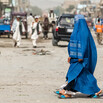Looking Back on the 2021 Robert L. Bernstein Symposium

Key Questions on the Role of Human Rights in a Paradigm Shift
At the 2021 Robert L. Bernstein Symposium titled “End Times for the Age of Human Rights? Confronting the Consequences of Global Crises,” international human rights scholars, practitioners, and students gathered to address the question of whether the human rights field is on the cusp of a paradigm shift. Paul W. Kahn, Director of the Orville H. Schell, Jr. Center for International Human Rights, moderated the discussion between Alex de Waal, Research Professor at Tufts University’s The Fletcher School and Executive Director of the World Peace Foundation, and Aziz Rana ’06, Richard and Lois Cole Professor of Law at Cornell Law School. Kahn began by questioning whether the COVID-19 pandemic is forcing a reconsideration of the human rights paradigm as the frame for understanding global crises. The COVID crisis, he suggested, is “beyond the grasp of human rights,” which is causing a kind of “theoretical anxiety” among scholars and practitioners.
“To say you’re on the cusp of a paradigm change is to say you don’t know what’s coming next,” Kahn said. “You feel a certain frustration with the conceptual tools available to you…But what is change going to look like? Where is it going to come from? That’s the question we’ve invited our speakers to address. The future of the world depends upon it.”
Below are highlights of the discussion among Kahn, de Waal, and Rana.
Why has the current human rights paradigm proved insufficient for addressing COVID-19?
Beginning the discussion, Kahn pointed to the virus’s global reach as one difficulty. “[COVID-19] is not easily contained within the nation-state, and it’s not easily addressed individual by individual. It’s not something for which courts can provide a remedy.” The pandemic shares these characteristics with some of the world’s most pressing problems, he indicated, including climate change and global recession.
These three major, global crises, Kahn noted, are “resistant to amelioration through the traditional means and methods of human rights.” They do not resemble the type of threat that the postwar paradigm of human rights envisioned, i.e., governments’ infringing on individual rights. “The problems of our era,” he explained, “are characterized by systemic problems that escape the traditional paradigm of the relationship between the individual and the government.”
This situation, Kahn said, has led to a rise in new forms of nationalism that are entering into the “broken space” of the human rights paradigm. It has also forced us to confront questions of transnational distributive justice: “What do rich nations owe the poor nations of the world? How should we be distributing vaccines?” Kahn explained, “That’s a problem that’s very resistant to human rights thinking and very resistant to national political thinking.”
Alex de Waal focused his presentation on the “logics…underpinning the current crisis.” The pandemic, de Waal emphasized, was linked to conceptual frameworks beyond the human rights paradigm that not only failed to adequately address its impact, but actually contributed to the devastation it wrought.
Among the logics de Waal identified was the idea that disease preparedness means eradicating threats, not addressing the underlying conditions that exacerbate them. De Waal characterized the approach as a “War on Disease.” We are “locked in,” he said, to “the same mindset [as the War on Terror], that these threats lurk out there in the wilderness, and our task is to identify each individual threat and hit it hard immediately, rather than dealing with the actual ecological disruption that gives rise to these threats or the societal ecologies that make them so dangerous.”
De Waal also spoke about the “end of confidence in a shared public sphere,” including widespread skepticism about science. He mentioned, too, the “enduring political theology of the state,” which is at the heart of our “deep discomfort about the perceived and actual efficacy of authoritarian political systems in dealing with communal diseases.” These trends, de Waal indicated, are essential to understanding the nature of our current predicament––“the wickedest of wicked problems.”
To Rana, the flaws preventing the human rights regime from adequately addressing the COVID-19 pandemic are intrinsic to the international order. “It’s worth noting the extent to which [the pandemic and similar crises] require a degree of global solidarity and resource redistribution that simply moves well beyond the terms of our existing arrangements,” Rana said. The flaws of the international order, he continued, end up “constraining the type of solidarity that’s necessary to address” global problems.
Rana believes that the issue is linked to the “traditional way” of thinking about international human rights in the Global Center: human rights abuses committed in the Global Periphery create instability, which the U.S. and Europe have a responsibility to resolve. “This has always been a fiction,” Rana said. The difference now, he explained, is that “it’s become very hard to depict the challenge of human rights…as coming from outside the Global North.” Failures in U.S. and to address the COVID-19 pandemic, extrajudicial killings by police, and the forced disappearance of migrant children were among the issues that Rana argued have made the “absurdity of the traditional story” impossible to ignore.
The current human rights regime, Rana said, has failed to achieve even its original vision. Intervention by the U.S. and Europe has not solved human rights violations in the Global Periphery. But for global crises rooted in failures of resource distribution, such as the COVID-19 pandemic, Rana argued, the international order is itself part of the problem. “The world today isn’t in a postcolonial moment…There continue to be differences in power,” he said. “We have an international order that’s built on the formal equality of states, but you have the basic fact of substantive inequality which powerful actors are continually acting on.”
Rana concluded by urging the Global Center to reframe its understanding of human rights. “I think it’s really important to conceive of the problems of human rights abuses and the international system generally…as just as much a problem of the internal domestic order of Western states and of the international system as they are problems for the Periphery,” he said.
How do global markets of capital and power undermine our ability to respond to transnational crises?
De Waal: The “marketization” of politics, where power, allegiance, and even government services are “becoming a trade or a commodity,” was one of the harmful trends de Waal identified. “This is very open and manifest in countries that I study in Northeast Africa and also in the Middle East. People talk very openly about a political market, about buying and selling loyalties,” de Waal explained. “I think it would be no stretch to say that was the way in which [former President Donald Trump’s] administration operated here.”
“The marketization of politics,” de Waal said, “is a fundamental challenge to our assumptions about institutional order and the direction of history toward state formation and state building.” Historically, de Waal suggested, the human rights field has understood moments of transition after authoritarian regimes as a moment to “hope for…human rights to be cemented by popular demand.” When transactional politics develop in these kinds of fragile states, however, “they descend very rapidly into turmoil.”
This dynamic, de Waal observed, seems to disincentivize pandemic response. “Those that benefit from turmoil,” he explained, “actually have an interestingly synergistic relationship with pandemic disease.”
Rana: “Centering the question of global capital is really significant,” Rana contended. The current international order, he said, is structured in a way that encourages resource-hoarding. States in the Global Center frequently take advantage of international economic inequality to win profits and compete with other powers. “All of this has created further instability,” he said.
We have seen, Rana explained, “the story of a global commons [becoming] a deeply privatized commons, in which market directives dictate state policy and the distribution of resources.” These conditions, he said, “make it hard to deal with truly global crises like a health pandemic.” He pointed out that during the pandemic, we witnessed the wealth of billionaires in the U.S. explode exponentially. In the midst of a crisis requiring global solidarity, where a lack of resources was contributing to mass death in the Periphery, the hoarding of capital remained the priority in the Center.
Where do we go from here?
For his last question to the panel, Kahn asked the panelists to consider what might replace the human rights paradigm. While the age of human rights might be coming to some kind of end, he suggested, “we are also at a new beginning.”
For de Waal, hope comes in the form of increasing mobilization around the global crises that the panel addressed, particularly among young people. “What we’re doing now ecologically and socially is unsustainable,” de Waal said. Yet, he continued, “it’s clear that governmental action on a major scale, that resources devoted to [our current crises]…can make a major difference.”
“Many of these conversations take place with a background assumption that the declining legitimacy of American global power is inherently a bad thing, and that’s not my view,” Rana said. “My view is that there are lots of reasons why we might actually prefer an international system that’s marked by much more genuine multipolarity.”
Rana acknowledged that some forms of multipolarity may well be worse than the current framework. Still, though, he saw a shift away from U.S. hegemony as opening potential space for improved arrangements. “The legitimacy of the American model both as a mode of political governance and when it comes to market capitalism is significantly diminished,” he said, “and that does create opportunities for an international system that’s marked by much higher degrees of inclusion for parts of the world that have not traditionally been decision makers.”


